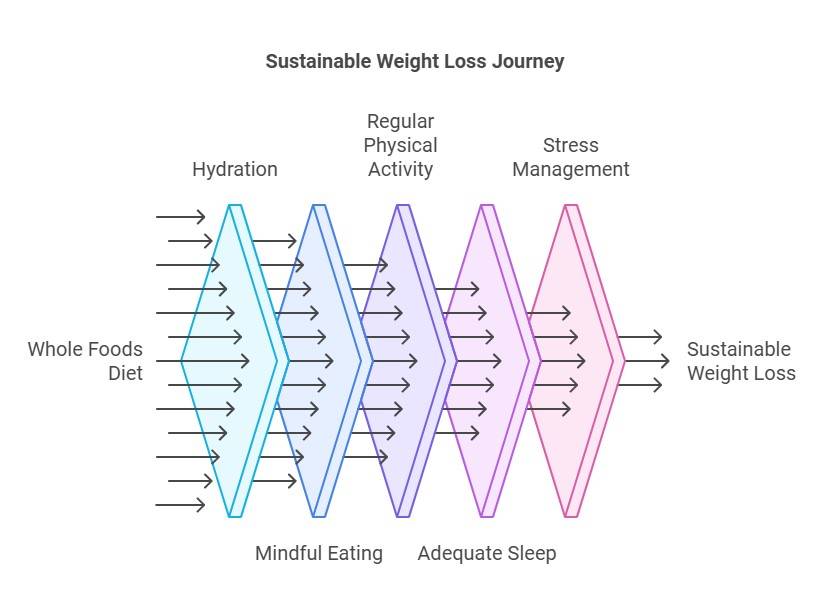Discover the healthy way to lose weight and transform your body and mind naturally. Learn simple, sustainable strategies for lasting results. Find out now!
Introduction
Healthily losing weight is not about quick fixes or extreme diets. It’s about making long-term, sustainable changes to your lifestyle that help you feel better physically and mentally. I have seen how small, consistent steps can lead to powerful results when combined with the right mindset. In this guide, I’ll walk you through a healthy way to lose weight that can help you transform your body and mind naturally. Let’s dive into how to develop a weight loss plan that is both sustainable and personalized to suit your needs!
Why the Healthy Way to Lose Weight is the Best Approach
Many people struggle with losing weight because they try fad diets or extreme weight loss programs. These methods can be harmful to your body and mind. Instead of focusing on short-term fixes, a healthy weight loss plan helps you make actual changes that will last a lifetime. It’s about adopting a balanced diet for weight loss, improving your habits, and focusing on long-term wellness.
In my experience, it’s not just about what you eat or how much you exercise, it’s about how you feel about yourself throughout the process. Achieving weight loss healthily involves developing a comprehensive plan that cares for both your physical and mental well-being.
Key Elements of a Healthy Way to Lose Weight Transformation

1. Start with Whole Foods for Weight Loss
One of the most important steps in any healthy way to lose weight is focusing on whole, natural foods. These foods are packed with the nutrients your body needs to thrive, and they help you feel full and satisfied for longer.
Whole foods include:
- Fresh fruits and vegetables
- Lean proteins like chicken, turkey, fish, eggs, and tofu.
- Whole grains (brown rice, quinoa, oats)
- Healthy fats (avocados, nuts, seeds, olive oil)
These foods are rich in nutrient density, meaning they give you more vitamins and minerals per calorie. They also help your body regulate your metabolic rate and energy balance. Eating whole food helps keep your metabolism running smoothly, which is essential for natural weight management.
Pro Tip: I like focusing on foods that are as close to their natural state as possible. When you eat clean, your body can process the food better, leading to weight loss transformation over time.
2. Hydration: A Simple but Powerful Weight Loss Tip
Water is your best friend for natural weight loss methods. Staying hydrated helps with digestion, boosts your metabolism, and keeps your skin healthy. Drinking enough water can also curb cravings and help you make better food choices.
Strive to drink a minimum of 8 glasses (64 ounces) of water daily. If you find plain water boring, try adding a slice of lemon, cucumber, or mint to give it a fresh twist. I’ve found that drinking water before meals helps me feel full, so I’m less likely to overeat.
3. Mindful Eating for Weight Loss
Practicing mindful eating is an effective strategy for those aiming to shed pounds. It involves being mindful while eating—focusing on what you consume, the quantity, and the effect it has on you.. This approach prevents emotional eating and overindulgence, both of which are common hindrances to weight loss.
Here’s how to practice mindful eating:
- Eat slowly and enjoy each bite.
- Pay attention to your hunger and fullness signals.
- Avoid distractions like TV or phones during meals.
- Concentrate on the taste, texture, and visual appeal of your food.
By practicing mindful eating for weight loss, you develop a healthier relationship with food and create lasting healthy habits for weight loss.
4. Regular Physical Activity: Fitness and Weight Loss
Including physical activity is essential for maintaining a long-term weight loss strategy. It aids in calorie burning, muscle building, and boosting your metabolism. The essential part is discovering activities you genuinely like. Whether it’s walking, yoga, swimming, or dancing, regular physical activity will keep your body healthy and improve your metabolic efficiency.
I personally enjoy walking in nature, and I’ve seen how daily walks improve my mood and help me stay on track with my weight loss goals. You don’t have to do intense workouts every day, but consistency is key. Even a 30-minute walk can make a big difference in your overall health.
5. Get Enough Sleep
Sleep is often overlooked for weight loss, but it plays a huge role. Poor sleep can mess with your hormones, leading to increased hunger and cravings. It also makes it harder to stay motivated and focused on your weight loss goals.
I’ve noticed that when I get enough sleep (7-9 hours a night), I feel more energized and make healthier choices throughout the day. Sleep is crucial for metabolic health and hormonal balance, both of which are important for sustainable weight loss.
6. Manage Stress for Weight Loss Success
Stress can trigger emotional eating and disrupt your metabolism, making it harder to lose weight. That’s why stress management is an essential part of any holistic weight loss approach.
Here are some stress-reducing activities to try:
- Deep breathing exercises
- Meditation or mindfulness practices
- Gentle yoga or stretching
- Spending time in nature
I’ve found that when I’m feeling stressed, going for a walk or practicing deep breathing helps me reset and stay focused on my goals. Reducing stress can help balance your cortisol levels, which is key for natural weight loss.
7. Focus on Balanced Meals
For effective weight loss, a balanced diet must provide your body with essential nutrients: protein, fiber, healthy fats, and complex carbohydrates. These foods help you feel satisfied, prevent overeating, and keep your energy levels stable throughout the day.
For example, a balanced meal might include:
- Lean protein (chicken, tofu, beans)
- Complex carbs (sweet potato, quinoa)
- Healthy fats (avocado, olive oil)
- Vegetables (broccoli, spinach, bell peppers)
I like to plan my meals ahead of time so that I always have healthy options available. Meal prepping is a great way to avoid last-minute unhealthy choices.
Note: Portion control is also an important part of a healthy diet for weight loss. Eating the right portions can help you maintain a calorie balance that supports your weight loss goals.
8. Sustainable Weight Loss: The Power of Patience
Patience is crucial for a sustainable weight loss plan. Remember, losing weight is more of a journey than a quick race. I have tested many diets, and I’ve found that those who make slow, steady changes see better long-term results. It’s better to lose weight gradually and develop lasting habits than to follow a quick-fix plan that leaves you feeling deprived and frustrated.
Celebrate your small wins along the way. Whether it fits into your favorite pair of jeans or noticing more energy during the day, these minor victories are important milestones in your wellness journey.
9. Stay Motivated with Weight Loss Motivation Tips
Maintaining motivation can be challenging, particularly when progress appears slow. Here are a few ideas to keep your motivation levels high:
- Set realistic, achievable goals.
- Track your progress, not just on the scale, but also through how you feel.
- Reward yourself for staying on track (just not with food!).
- Surround yourself with supportive people.
I’ve found that connecting with a community of people on a similar weight loss journey helps me stay motivated. Share your progress, encourage others, and celebrate your achievements together.
10. Natural Weight Loss Supplements: Do They Work?
You might wonder about natural weight loss supplements. While some supplements claim to help with weight loss, no pill can replace healthy lifestyle changes. Supplements can sometimes support weight loss, but they should never be the dominant strategy.
Exercise holds significance beyond just burning calories; it contributes to your overall health and well-being. If you do choose to use supplements, ensure to research them carefully and consult with a healthcare professional first.
Note: Be cautious of quick-fix solutions. A holistic wellness approach is much more effective and sustainable than relying on weight loss pills or shakes.
FQAs about Healthy Way to Lose Weight
Q: Can I lose weight without counting calories?
Yes! Focus on eating whole, nutrient-rich foods and practice mindful eating, and you may maintain a healthy weight without obsessing over calories.
Q: What amount of weight can I anticipate losing?
Weight loss varies for each person. A healthy rate of weight loss is about 1-2 pounds per week. Focus on developing healthy habits instead of seeking rapid weight loss.
Q: Can I still enjoy my favorite foods?
Yes! It’s all about moderation. Enjoy your favorite foods in small portions and balance them with healthier choices.
Q: How important is exercise for weight loss?
Physical activity is crucial, not only for burning calories but also for your overall health. Find physical activities you enjoy making it a regular part of your routine.
Q: What if I experience a weight plateau?
Plateaus are normal. Use them as a chance to reassess your habits, adjust your routine, and stay committed to your long-term health goals.
Conclusion: Your Path to a Healthy Way to Lose Weight
The healthy way to lose weight is not about following a strict diet or doing extreme workouts. It’s about creating a healthy lifestyle with balanced meals, regular physical activity, stress management, and plenty of self-care. By focusing on natural weight loss methods like mindful eating, staying hydrated, and getting enough sleep, you can achieve sustainable weight loss without feeling deprived or overwhelmed.
The key is to remain patient and maintain consistency. Healthy habits for weight loss take time to develop, but they’re the foundation of lasting results. Stay motivated, stay positive, and embrace transforming your body and mind.
By following these steps, you can begin your weight loss transformation today—naturally, safely, and sustainable.

Adel Galal is a health and wellness writer with over 30 years of experience studying and writing about health, fitness, nutrition, and healthy living. He is the founder of NextFitLife.com, where he shares practical, evidence-based guidance to support long-term health at any age. Adel’s mission is simple:
to help people make smarter health choices that fit real life, at any age.



